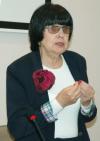1. Kolesnikova I.A. Novaya gramotnost' i novaya negramotnost' dvadtsat' pervogo stoletiya.// Nepreryvnoe obrazovanie: XXI vek, 2013, № 2
URL: http://lll21.petrsu.ru/journal/atricle.php?id=2091 (Accessed: 25 May 2014)
2. Kudashev E.B., Markov S.YU., Popov M.A. Ispol'zovanie geterogennoy prostranstvennoy informatsii pri reshenii zadach ustoychivogo razvitiya territoriy. URL: http://www.elbib.ru/content/journal/2011/201103/PMK/PMK.ru.html (Accessed: 21 May 2014)
3. See e.g.: Standarty, opredelyayushchie uroven' znaniy v oblasti informatsionnoy gramotnosti. URL: https://library.auca.kg/ru/standards/; Towards Information Literacy Indicators. Conceptual framework paper prepared by Ralph Catts and Jesus Lau.- UNESCO: Paris, 2008 URL: http://www.ifap.ru/library/book277.pdf ; Evropeyskaya ramka IKT –kompetentsiy... URL:http://pptonline.ru/slide/id/182274 European E-competence Framework. URL: www.ecompetences.eu E-Skills for the 21st Century: Fostering Competitiveness, Growth and Jobs. September 2007. URL: http://ec.europa.eu/enterprise/sectors/ict/files/comm_pdf_com_2007_0496_f_en_acte_en.pdf
Sonference “e-Skills and Education for Digital Jobs” on 4 March 2013 in Brussels URL: http://eskills2013.eu/conference/conference/ (Accessed: 30 May 2014)
4. Beketov N. Informatsionnoe raznoobrazie i tsifrovoe neravenstvo v razvitii Rossii. //«INFORMATSIONNY'E RESURSY' ROSSII» №5, 2009. URL:
http://www.aselibrary.ru/digital_resources/journal/irr/2009/number_5/number_5_3/number_5_3976 (Accessed: 31 May 2014)
5. Primenenie IKT v vysshem obrazovanii stran SNG i Baltii: tekushchee sostoyanie, problemy i perspektivy razvitiya. Analiticheskiy obzor / SPb.: GUAP, 2009.
6. D'yakova E.G. Sotsiokul'turnye aspekty i natsional'nye modeli resheniya problemy informatsionnogo neravenstva. // Izvestiya Ural'skogo gosudarstvennogo universiteta. 2010. № 1(73), P.17-27.
7. Erokhin M.N.,. Mikhaylenko O.A. Informatsionnoe obespechenie podgotovki inzhenernykh kadrov sel'skokhozyaystvennogo proizvodstva /Nauchno-informatsionnoe obespechenie APK. Materialy V Mezhdunarodnoy nauchno-prakticheskoy konferentsii. – M., 2011. URL: http://www.rosinformagrotech.ru/institut/infagro10.pdf (Accessed: 28 May 2014)
8. Tan D. P., Makvil'yam E'. L. Kognitivnyy igrovoy nastroy, kreativnost' i pokolenie «‘c’ learners».// Nepreryvnoe obrazovanie:XXI vek, 2013, №2. URL:
http://lll21.petrsu.ru/journal/atricle.php?id=2090 (Accessed: 20 May 2014)
9. Srednesrochnaya strategiya IITO na 2008-2013 gg. M., Institut YUNESKO po informatsionnym tekhnologiyam v obrazovanii. URL: http://ru.iite.unesco.org/files/strategy_ru.pdf (Accessed: 31 May 2014)
10. Ignatovich E.V. Podgotovka studentov i prepodavateley pedagogicheskogo kolledzha k informatizatsii kul'turno-vospitatel'noy/ obrazovatel'noy sredy na osnove modul'nogo podkhoda / Podgotovka studentov i pedagogov k innovatsionnomu proektirovaniyu kul'turno-vospitatel'noy sredy v shkole i vuze: Pedagogicheskoe issledovanie / E.V. Ignatovich i dr. / SPb.: Izd-vo RGPU im. A.I. Gertsena, 2010. – P.110-150.
11. Pavlova T.YU., Popov YU.S. Analiz urovnya podgotovki prepodavateley vuzov v oblasti IKT. / Edinaya obrazovatel'naya informatsionnaya sreda: problemy i puti razvitiya: materialy vos'moy mezhdunarodnaya nauchno-prakticheskaya konferentsiya-vystavka (Tomsk, 17-19 September 2009). – Tomsk: Izd-vo TGU, 2009.– S.37-39. URL: http://www.ict.edu.ru/vconf/files/11258.pdf (Accessed: 30 May 2014)
12. Yu. V. Gulyaev, E. E. Zhuravlev, A. YA. Oleynikov. Metodologiya standartizatsii dlya obespecheniya interoperabel'nosti informatsionnykh sistem shirokogo klassa. Analiticheskiy obzor. //Zhurnal radioelektroniki, 2012, №3. URL: http://jre.cplire.ru/koi/mar12/2/text.html (Accessed: 1 June 14)
13. Mifologiya Interneta// E'kspert № 27 (95), 1997 URL: http://www.internettrading.net/guru/ex/new_myth.html (Accessed: 1 June 2014)
14. See: KHeylingeym Frensis. Superorganizm E'volyutsionno-kiberneticheskaya model' informatsionno-setevogo obshchestva. URL:http://pespmc1.vub.ac.be/Papers/Superorganism.pdf
15. Crane Diana. Invisible colleges. Diffusion of knowledge in scientific communities. The University of Chicago Press: Chicago and London. 1972. Caroline S. Wagner. The New Invisible College: Science for Development. Brookings 2008. (Accessed: 4 May 2014)
16. See e.g.: sayt Evropeyskoy komissii URL: http://cordis.europa.eu/fp7/ict/enet/ei-isg_en.html (Accessed: 3 June 2014)
17. Giddens, E'. Ustroenie obshchestva: Ocherk teorii strukturatsii. - M.: Akademicheskiy proekt, 2003.
18. See Kovalenko Marina Ivanovna. Metodologicheskie osnovy povysheniya kvalifikatsii shkol'nykh uchiteley i prepodavateley pedagogicheskikh kolledzhey i vuzov starshego vozrasta v oblasti informatsionnykh i kommunikatsionnykh tekhnologiy. Dissertatsiya doktora pedagogicheskikh nauk. Moskva 2009.
19. Podrobnee sm. na sayte Instituta listantsionnogo obucheniya NGTU. URL: http://ido.nstu.ru/publication/view/236 (Accessed: 3 June 2014)
20. Kolesnikova I.A. Opyt podgotovki t'yutorov-tekhnologov dlya obrazovatel'nogo uchrezhdeniya// Na putyakh k novoy shkole. 2009, № 1, P. 108-113
21. Manuel' Kastells, Peka KHimanen. «Informatsionnoe obshchestvo i gosudarstvo blagosostoyaniya: finskaya model'». Perevod s angliyskogo: A. Kalinin, YU. Podoroga, Moskva, 2002. Tsit. po D.A. Kazimirov Zakonomernosti razvitiya bystrorazvivayushchikhsya i vysokorazvitykh gosudarstv. URL: http://kazimirovda.ru/book/chapter1/ (Accessed: 20 May 2014)
Kolesnikova I. A. The problems of information heterogeneity within the academic community. LIFELONG EDUCATION: The 21st Century.
2014. № 2 (6).DOI: 10.15393/j5.art.2014.2370
2014. № 2 (6).
| Issue 2 (6) | Discussion platform |
 pdf-version |
The problems of information heterogeneity within the academic community
 | Kolesnikova I A D.Sc., full professor, head of Autonomous Non-Commercial Organization «COMENIUS Agency». (St. Petersburg) I.A.Kolesnikova@yandex.ru |
|
Keywords: information literacy divide digital divide heterogeneity academic community e-competence. |
Abstract: the article discusses the problem of informational heterogeneity of modern academic community and the ways to overcome it. The concept “informational heterogeneity” suggests that the involvement of scientific and teaching staff in using modern information and communication technologies (ICT) is different. The paper draws attention to a constant digital divide among professors and education researchers. The author analyzes the studies on the use of ICT in the system of continuous education and concludes that the main obstacle for the introduction of ICT in education is psychological and functional unpreparedness of academic staff to use ICT. The article provides numerous facts indicating that the information literacy divide implies the lack of motivation among many Russian teachers to use ICT and improve the methodology. As a result, a digital divide creates a professional divide. The changes in the activity of academic staff associated with the acquirement of a wide range of e-competencies should be focused on the following areas: teaching and research activity, teaching and scientific communication, professional image creation. The most common reasons for the reluctance to use ICT are mentioned in the article. The author suggests the way to lessen the digital divide through practice-oriented, personalized, module forms of advanced training, followed by a mandatory stage-by-stage evaluation of each type of work. The idea is based on the study of modern advanced ICT training and the author’s personal experience. This training should enhance teacher’s emotional experience by providing the practical benefits of the inclusion into the modern ICT world. Besides, the paper emphasizes the effectiveness of heterogeneous creative groups (considering different age, position in the educational process, teaching specialization, e-competence level), working on specific projects (research, methodological, etc.) based on the use of various multimedia and electronic resources. The conclusions presented in the article are debatable and may give an impulse to further professional discussion. |
Paper submitted on: 05/25/2014; Accepted on: 06/21/2014; Published online on: 06/25/2014.
Displays: 7928; Downloads: 1024;
DOI: http://dx.doi.org/10.15393/j5.art.2014.2370










